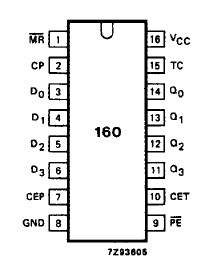74HCT160: Features: · Synchronous counting and loading· Two count enable inputs for n-bit cascading· Positive-edge triggered clock· Asynchronous reset· Output capability: standard· ICC category: MSIPinoutDesc...
floor Price/Ceiling Price
- Part Number:
- 74HCT160
- Supply Ability:
- 5000
Price Break
- Qty
- 1~5000
- Unit Price
- Negotiable
- Processing time
- 15 Days
SeekIC Buyer Protection PLUS - newly updated for 2013!
- Escrow Protection.
- Guaranteed refunds.
- Secure payments.
- Learn more >>
Month Sales
268 Transactions
Payment Methods
All payment methods are secure and covered by SeekIC Buyer Protection PLUS.

 74HCT160 Data Sheet
74HCT160 Data Sheet







